A Touch of Dark (Painted Sin Book 1) Read online
Page 2
I usually avoid this entrance. Guests and visitors alike flood in through glass doors at all hours. It’s noisy and loud—kryptonite to my nerves. Tonight, the atmosphere feels even more electrified than usual. A glance ahead reveals why. A crowd swells beyond the lobby doors, held back by the hotel’s security. Blurred faces jockey for space along the glass, illuminated by intermittent camera flashes. Reporters. For me? Daddy’s house has been swarmed for months, but no one has bothered me yet.
My palms start to sweat, which irritates the open cuts, and breathing takes more focus. Ironically, there’s a remedy for the anxiety nearby: the lobby bar directly to my left. Oh, the promise of more wine. Merlot makes for a tempting diversion, but something else catches my attention before I can claim a stool for myself.
Misery loves company, and I’m not the only one having a shitty night.
“How was I supposed to know?” a woman hisses into a cell phone. Hunched against the wall, she draws notice anyway, being tall, blond, and dressed to the nines in a black suit. Clutched in her free hand is a clipboard she’s waving through the air like a shield against guilt.
“Look. I had no idea he’d be this pissed off. I saw the address on some documents in his studio and they had amazing rates and—” She purses her red lips. “No. It’s too late to change it now. I think he’s on his way. I have to go.”
She hangs up and crosses the reception hall to stand near an archway that has a sign propped on an easel beside it. The real reason behind the sudden increase in publicity? The hotel sometimes hosts events open to the public. In fact, I’ve booked a few for clients of mine here and there. Book signings. Galas.
A Window into the Soul this advert reads, red font printed over a black backdrop. Displaying the art of Sampson. I’d recommend the design to my own clients: It’s simple but bold enough to draw the eye to the artist’s name.
Sampson. I’ve never heard of him, though I appear to be in the minority. People are waiting in a sizeable line to enter the ballroom, craning their necks for a glimpse through the doorway.
“Miss?” The woman with the clipboard watches me expectantly from the distance of a four-person gap. I’ve wandered into the line without realizing. “Do you have a ticket?”
I shake my head, and she nods.
“Don’t worry. Sampson appreciates every guest, and we always offer vouchers at the door. I just need your name.”
“Juliana Thorne,” I say, stepping forward. “What exactly is this…”
My gaze cuts toward the doorway behind the woman and whatever else I meant to say dies in my throat. I’m vaguely aware that I’m still moving, drawn forward like a moth to a flame.
The portrait hanging from the wall ahead is a woman composed of ivory, lying contorted on a bed of blood-red roses, her eyes unseeing, her hands grasping at nothing. Etched with incredible care, she looks livelier than the person I see whenever I look in a mirror.
Woefully alive and yet painfully dead.
The artist didn’t spare an ounce of detail. Every wayward hair, pimple, birthmark, and scar of his subject is on display in stark clarity.
“Incredible, isn’t it?” someone exclaims beside me.
“W-what?” I blink as the rest of the world returns one jarring realization at a time. For starters, I’m standing in the back of the ballroom, nearly nose-to-nose with a painting hanging from the wall. A sheet of glass separates me from it and displays my reflection.
Wide-eyed. Mouth agape. Pupils dilated. Red lips that quirk into a frown. I’ve never seen this look on my face before. I take my time trying to pin down just what it might be but fail to come up with a single term.
“Here, you forgot to take this.”
A glossy brochure makes its way into my hands courtesy of the blond woman who worked the door.
She catches me staring and winks. “I felt the same way the first time I saw one of his works. Enjoy.” She scurries off, leaving me to survey the rest of the gallery alone.
Twenty women join the first, trapped in their own worlds of darkness and roses. Observed together, they rip me from the elegant setting, dragging me into each brutal scene. Flowers. Passion. Death. Those are the recurring themes.
I’m no art connoisseur, but I can recognize talent—and this artist oozes it in every brushstroke, along with a million other tiny details. Such as his indifference to his subjects. The cruel attention given to the fear lurking in those blank irises. The cold, twisted elegance of lifeless limbs.
Each portrait pulls me in before I’m swept along to the next. Far too soon, I find myself before the first painting again, unable to toe the respectful distance every other spectator keeps. Curiosity yanks me closer against my will, step by step.
Finally, I reach out with a trembling finger—
Commotion.
I turn and find a gaggle of people huddling together in the center of the ballroom, jockeying for a glimpse of someone: a man whose sheer presence urges people from his path. Literally. The crowd parts like the Red Sea.
“It’s him,” I see a woman mouth to her companion, wide-eyed.
Him. The lone unaffected figure, I presume. A man who takes my breath away—the same way walking outside, butt-ass naked in the dead of winter would.
Suddenly and lethally.
My father is—was—a judge, and I’m more than used to imposing men. We had politicians who controlled the livelihoods of the entire state over for breakfast. I lived in the mayoral mansion for three years. Summered with the governor’s children.
Neither Daddy nor those in his orbit ever commanded a room as this man does. And for that, I count my blessings. Simon is terrifying enough to live in the shadow of—and he’s just a shadow.
This man is darkness. He stands tall, wearing black almost from head to toe: a tailored suit that screams of old money and careful taste—and brawn. The ebony material strains over broad shoulders and muscular forearms.
Trailing my gaze upward, I expect a face worthy of the intrigue, but he’s like one of these paintings: a mixture of handsome and strange. A stern jaw anchors what I can only assume are Romanesque features, mingled with a hint of the exotic, though a dark blindfold obscures most of them, hiding his eyes. It’s tied neatly over the bulk of a black ponytail that reaches down to his shoulders.
Such a strange accessory, though it doesn’t appear to hinder his confident stride.
“I can’t believe it’s him in the flesh,” a woman nearby whispers. “He doesn’t look like a kingpin.”
Is he a celebrity of some kind? Or maybe the artist himself? I browse the brochure in my grip, but it only contains representations of the paintings, never their creator.
When I look up again, he’s holding court in the back corner of the ballroom as men in black suits stand guard nearby, intimidating the crowd from coming too close. Beside the blindfolded man is the blond woman. Her gaze cuts in my direction as her lips move rapidly near his ear.
I turn back to the painting and try to shut the rest of the world out again. It’s surprisingly easy to, the longer I stare. No need for pills or booze. Just soulless eyes formed from intricate strokes of paint.
The woman could be me in the right lighting. Therefore, she’s the perfect canvas to project all my flaws onto. Alive, I bet she wore Versace and hated her birthday.
I bet she hated herself.
The longer I stare, the uncannier the resemblance seems. Am I seeing more of my reflection than the art? I brush my fingers against the glass, but I can’t decipher what’s paint and what’s reflection.
“Do not touch, por favor.” The deep voice accompanies the hand seizing my wrist without warning.
I shiver and whirl around. Then my brain stalls, spitting out a few disjointed thoughts before total malfunction. Handsome. Dark. Up close.
“The glass is fragile,” the blindfold-wearing man warns. His voice is deeper than I expected by looking at him. Suave, grated tones fall like off-notes from a piano. Jarringly out of place.
> “Sorry,” I croak, wrenching my hand back. My heart races, surging beneath my skin. Strange. I press my fingers there, counting each frantic beat. Thump. Thump. Thump. “S-sorry,” I repeat.
His jaw tightens in an elegant display of rippling muscle. “You need to leave.”
“I…I’m sorry?” People are staring. Probably at me: openmouthed, my cheeks flaming. “I didn’t mean—”
“I’ll have my men escort you out.” He nods, beckoning one of the stern-faced bouncers closer.
“W-wait.”
Just leave, Juliana, a part of me urges. I have a birthday to conclude. Screams to smother. Dealing with some conceited prick should be an easy headache to tick off my to-do list. Or not.
“Are you the artist?” I ask.
At the sound of my voice, he grits his teeth. A silent denial? Or grudging acknowledgment?
“I…I’m interested in buying. I think.”
“Are you even familiar with the artist’s work?” A droll quality laces his tone. Amusement? No, something darker that makes me quiver in my heels before I can help it: hostility.
Another “admirer” of my family, perhaps? I bite my lip and resist the urge to kick myself for not taking Daddy’s advice to hire a bodyguard. To be fair, my reasoning made sense at the time. Why pay for someone who would always prove ineffective against the real monster?
“Are you?”
My cheeks heat when I realize I still haven’t answered him. “No,” I say. “I’ve actually never heard of him until tonight.”
“Oh?” He runs the edge of his thumb along his chin. I can’t shake the feeling that the act draws attention to his face on purpose. Again, I suspect he knows me as more than just a story from the tabloids. But I don’t know him. “And your thoughts?”
The change in subject is enough to give me whiplash. “Well…” I return my attention to the painting. Nice would be the polite word—or something along those lines. Something to strike up a conversation around. Any other day, I’d know what to say. Tonight, I’m filter-less. “I think…I think it’s terrible.”
“Terrible?” The man laughs. “How so?”
“I…” I shrug, once again compelled toward honesty. “Not in a bad way.”
“This isn’t the place for you.” His warm breath heats my earlobe and chills me to the core, making me jump. “I suggest you leave. Now.”
“Why?” I counter, surprised by how irritated I sound. “If you recognize me from the news, I’m not drawing attention to myself.”
“If?” he wonders, his tone dangerously soft. “Perhaps you’ve recognized me from the ‘news’?”
“No.” I feel like I’ve missed something. Maybe he is a celebrity—some pompous prick with his head so far up his ass that he can’t stand not being recognized. “I think I’d remember you,” I say.
A shadow flickers over the glass in front of me as I sense him looming over my position from behind. He smells strange up this close. My flared nostrils gobble up the scent but I can’t place it.
“One would think you would.”
I know he’s gone without having to turn around, but the aftermath of his tone ricochets through me. I should do what he said: leave. But before I can take a step, my gaze returns to the painting and I’m riveted once more. It’s as if the woman’s dead stare perfectly sees through everything I try to hide and, unlike the rest of the world, she gives it to me straight.
You’ll never fit in.
“Excuse me, miss.”
The blond woman from the door yanks me from my reverie for the second time. She’s lost her clipboard, clutching a stack of brochures in her hands instead.
“I’ll leave in a minute,” I insist.
“Oh, but I’m sorry. The gallery is closing.” She gestures behind her. Sure enough, the crowd has dissipated. I’m the only guest remaining.
“Oh.”
A tendril of anxiety gnaws away at the lining of my stomach. No, not yet. Five more minutes. Or maybe longer.
“How much is this one?” The question is out before I can reel it back in.
Impulsivity. It’s one of the many traits my therapist urged me to work on. Acting on impulse led me to alcohol. Bad decisions. Oopsies. Mistakes.
“How much?” The woman blinks. “I-I’m not sure, but Mr. Sampson’s work has sold in the tens of thousands before—”
“What about twenty?”
“I-I don’t—”
“Fifty, then.” I step closer to the painting, leaving her to decide on an answer, even as I reach into my pocket for my checkbook.
Odd. This painting makes for the first birthday present I’ve wanted in years. One dark enough to rival even Simon’s grim offerings.
Happy birthday to me.
Come out, come out, Juliana…
I bolt upright, drenched in a cold sweat as my eyes fly open to my empty room, and the icy noose of fear loosens with the realization that I’m alone. It was just a bad dream, though Simon wasn’t the nightmarish figure who chased me awake this time.
No. My pursuer sported a blindfold, his motives a mystery but his hatred more electric than the flashes of lightning greeting me from beyond my window.
An omen?
Or a reminder. Simon’s days of gift giving aren’t over yet. He always allows me twenty-four hours in between our games, but no more.
Usually, I’d spend that time stocking up on wine, but I’m forced to oversee the cleaning crew tasked with reassembling the shambles of my apartment first. They fix my bedframe and repair the damage to my closet, assembling the clothes in the correct color-coded order. One benefit of using the same company every year is that the workers know my preferences—but they never ask questions. I pay extra to ensure that.
I also order them to avoid the bathroom. For now, anyway.
Afterward, I catch up on a bit of work and find a message on my cell phone from Heyworth Thorne. See you tonight, sweetie.
Every year, he humors just one request, a truce of sorts: We forsake dinner on my actual birthday, but the night after, he insists.
How he loves to show me off. Perfect little Juliana: the traumatized brat he took in out of kindness and turned into an upstanding citizen. Presto! Like magic.
Love makes it easier to withstand the lying, but never the guilt. God, I wish I could be that person for him. The perfect daughter. I try. I’ve tried. But being her is like wearing a pretty dress. After a while, it itches. The material wears away at the seams. It tears.
Until it isn’t so beautiful anymore.
Tonight, my disguise will be a black Vera Wang paired with something navy. Hmmm. I scour the glass display case along the back wall and hunt for a fitting necklace. The sapphire Daddy gave me a few years ago will do.
With my costume all picked out, I linger in the living room and watch the world waste away down below. The real estate agent referred to this view as “to die for.” Maybe she’s right. Three years spent where Simon can easily find me and one glance from the window makes the torment almost worth it.
I can watch people play out their lives from this height without them ever being the wiser. That woman walking her poodle has performed the same routine for two hundred and seventy-two days in a row. There are no calls from Simon to disrupt her charming façade. No. It’s the scruffy man she lets creep into her house late at night when only the glow of passing traffic can illuminate him.
They do their song and dance day in and day out, but she never forgets to wear her pretty smile in the aftermath.
I practice mine in the reflection on the window. Wide, but not too wide.
I almost fool myself.
A sudden knock on the door interrupts my practice and a frown flutters across my lips, displacing my hard-earned expression. But then I remember.
Giddy. That’s the only way to describe the bubbling sensation building in the pit of my stomach as I pad across the foyer and answer the door.
The blond woman from the gallery stands on the other end of it. She
’s exchanged the pantsuit for a gray skirt-and-blouse combo.
“Ms. Thorne?”
I nod, and she steps aside, revealing a man behind her pushing something long and square balanced on a utility cart.
“I took the liberty of accepting your bid on Mr. Sampson’s behalf,” the woman explains. “Were you still interested in the painting?”
“Yes.” I lurch out of the way, allowing them inside.
Due to disposal limitations, the earlier cleaners left the glass shards of my grandfather clock in a bin near the door for later pickup, though I had them wipe the blood from the walls, at least. The woman eyes the mess before directing her attention to the empty wall adjacent to the floor-to-ceiling windows. Prime real-estate for a morbid portrait, apparently.
“Here?”
I agree and the worker snaps to attention. He removes a plastic covering, revealing the painting. When viewed in the overcast daylight filtering into the room, it looks grislier than it did last night. Ghostly and harrowing. I suck in an appreciative breath and write the fifty grand off as money well spent.
Once the painting is mounted, my one regret is not buying a matching frame for it. Encased only in a covering of protective glass, it looks far too delicate against my muted design scheme.
“Mr. Sampson appreciates your patronage,” the woman says once I’ve signed the final document she shoved beneath my nose. “I’ll let you in on a secret: He donates most of the proceeds to charity anyway. Though I have to say that not everyone appreciates his work.”
“Oh?” I bite back the words that spring to my tongue. No wonder. If he treats every prospective buyer like he did me, I can imagine why.
“I’m surprised you haven’t asked about him,” she adds, an eyebrow raised. “No offense, but the few who do buy the paintings—and they all are mostly women—tend to use the sale as a foothold to pry. ‘Are all the stories true?’” She mimics how I assume she thinks a socialite with thousands of dollars to spend on a painting sounds. “I will say I’m impressed. I think that’s why I’m even here in the first place. He rarely offers a painting for sale, but hopefully he won’t mind. At least you won’t try to hound him for a date. To some women, he’s more myth than reality now.”

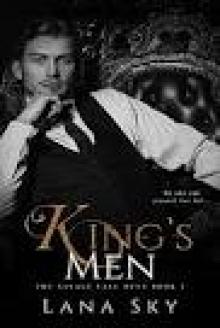 King's Men
King's Men Conquer (XXX Vadim Book 3): Club XXX Book 6
Conquer (XXX Vadim Book 3): Club XXX Book 6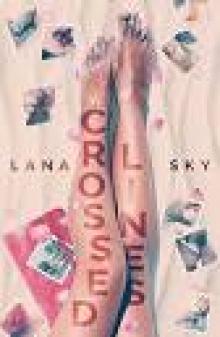 Crossed Lines
Crossed Lines Refrain (Beautiful Monsters Book 2)
Refrain (Beautiful Monsters Book 2)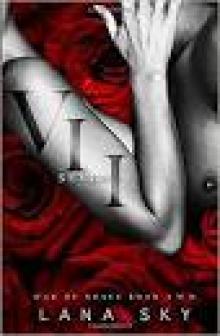 VII (Seven)
VII (Seven)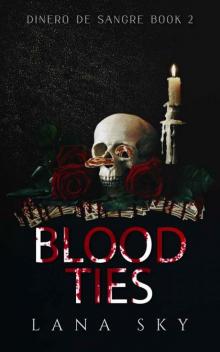 Blood Ties (A Dark Cartel Romance) (Dinero de Sangre Book 2)
Blood Ties (A Dark Cartel Romance) (Dinero de Sangre Book 2) Submit
Submit Corrupt (XXX Vadim Book 2): Club XXX Book 5
Corrupt (XXX Vadim Book 2): Club XXX Book 5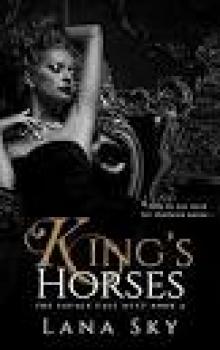 King's Horses
King's Horses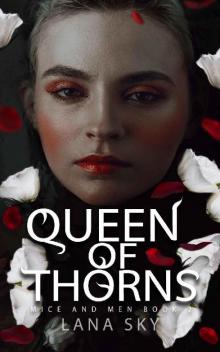 Queen of Thorns: A Dark Mafia Romance: War of Roses Universe (Mice and Men Book 2)
Queen of Thorns: A Dark Mafia Romance: War of Roses Universe (Mice and Men Book 2) Refrain
Refrain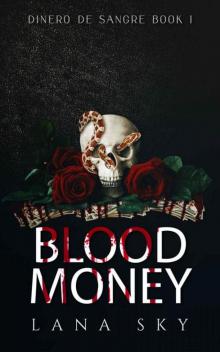 Blood Money (Dark Cartel Romance) (Dinero de Sangre Book 1)
Blood Money (Dark Cartel Romance) (Dinero de Sangre Book 1) Surrender: XXX Maxim Book 3 (Club XXX)
Surrender: XXX Maxim Book 3 (Club XXX) A Touch of Dark (Painted Sin Book 1)
A Touch of Dark (Painted Sin Book 1) XV: (Fifteen) (War of Roses Book 1)
XV: (Fifteen) (War of Roses Book 1)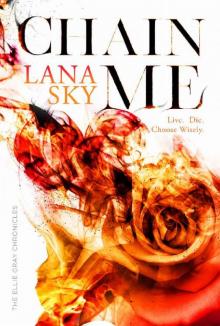 Chain Me (The Ellie Gray Chronicles Book 2)
Chain Me (The Ellie Gray Chronicles Book 2) Control: XXX Vadim Book 1 (Club XXX 4)
Control: XXX Vadim Book 1 (Club XXX 4)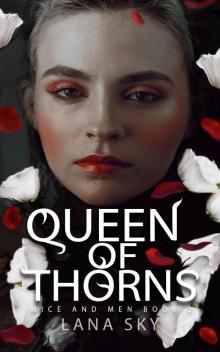 Queen of Thorns
Queen of Thorns Surrender
Surrender I (One)
I (One)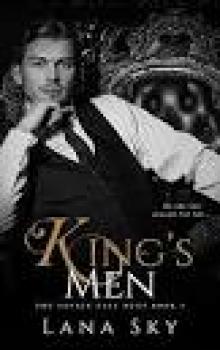 King's Men (Savage Fall Duet Book 1)
King's Men (Savage Fall Duet Book 1) Corrupt
Corrupt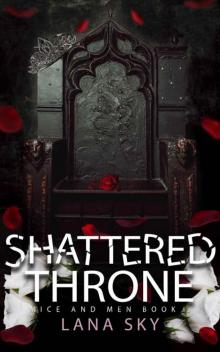 Shattered Throne: A Dark Mafia Romance: War of Roses Universe (Mice and Men Book 3)
Shattered Throne: A Dark Mafia Romance: War of Roses Universe (Mice and Men Book 3) Obey: XXX Maxim Book 2 (Club XXX)
Obey: XXX Maxim Book 2 (Club XXX) Conquer
Conquer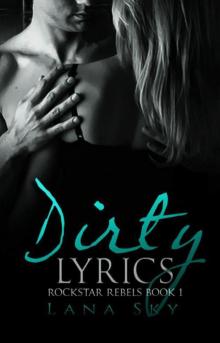 Dirty Lyrics
Dirty Lyrics Submit: XXX Maxim Book 1 (Club XXX)
Submit: XXX Maxim Book 1 (Club XXX)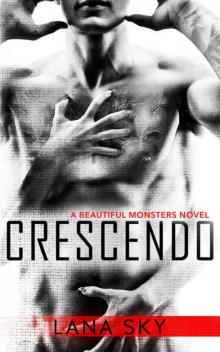 Crescendo (Beautiful Monsters Book 1)
Crescendo (Beautiful Monsters Book 1)